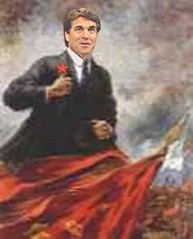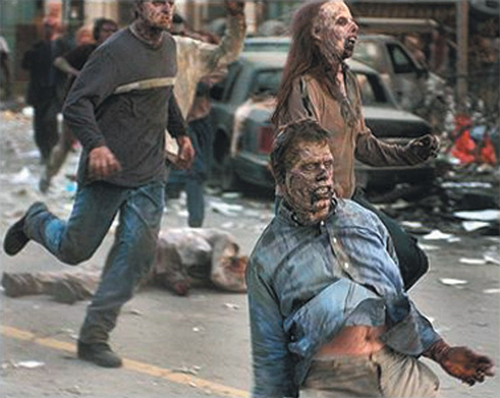Rick Perry: "Soviet-Style Budgeting" and "Hot Air Politics"
3/9/10
by Ross Ramsey
Texas Tribune
Copyright 2010

---------Comrade Perry------------
Democrat Bill White said he won't rely on "Soviet-style budgeting" and "hot air politics" if he's elected governor, and said the state should make education its first priority and would be better off with a governor who's got business experience when it comes to economic development.
In a wide-ranging interview at the Tribune's "TribLive" event this morning, the Democratic gubernatorial nominee said the state has work to do to stay ahead of "dark clouds" on the horizon in education and economic development and other areas. He criticized Republican Gov. Rick Perry as a divisive chief executive who wastes more time campaigning and "railing about things he can't control" than he does working on state problems like education and controlling dropout rates and making college more affordable. "Leadership is not dividing people into teams… leadership is finding common ground," White said.
The candidate said education would be the state's top priority if he's elected, and said Perry is understating the number of students who drop out of high school every year. "We should treat someone dropping out of school as an emergency, like we treat a broken leg," White said.
He said the state needs a long-term plan to promote excellence in education, expanding Texas Grants, making school more affordable and making the schools themselves more productive and efficient. "Don't tell me there aren't some people [there] who haven't retired on the job," he said. The state can't afford to "export" its best students to out-of-state schools like the University of Georgia, Oklahoma, and LSU, he said. "We ought to be importing people who are better educated," he said. The state should combine limits on increases in tuition with commitments to provide adequate state funding to offset costs, he said.
"This is a great state, but there's dark clouds on the horizon if we don't train and educate our people," he said.
He criticized the across-the-board five percent budget cuts ordered by state leaders as "Soviet-style budgeting," and touted his record as mayor of Houston, saying the city kept its budget balanced by reacting more quickly to signs of economic downturn, and accomplished cuts with "productivity improvements" and renegotiated contracts with vendors and other measures. "You don't do it with some memo across the board," he said, referring to a letter from Perry, Lt. Gov. David Dewhurst and House Speaker Joe Straus III to state agencies last year.
Dewhurst said the Democrat is trying to generate headlines. "We asked state agencies to tighten their belts and identify five percent savings, without eliminating any essential services," the lieutenant governor said in a statement. "Now, more than ever, Texans are looking for leaders who are willing to make the right decisions and practice prudent fiscal discipline, instead of grandstanding."
White danced around questions on taxes, neither promising to cut them nor to leave them where they are. "Until you look under the hood… you shouldn't be making that decision," he said.
That earned him a towel snap from Perry spokesman Mark Miner. “Bill White has a tax problem — he won’t rule out raising taxes for Texans and refuses to release his own tax returns," Miner said in a press release. "His opposition to transparency raises questions about what he is afraid of and what he is hiding regarding his own personal fortune and how he may have profited during his six years as Houston’s mayor.”
White dismissed a memo from Dave Carney, Perry's New Hampshire-based chief political consultant, that outlined a line of attack the Republican might pursue against the Democrat. "Where does he live?" White joked. "He's from… New England?"
Carney's memo describes White as a trial lawyer. That's true or not, White said, depending on the definition. "I have tried cases. I represented businesses… If you say, 'plaintiff's personal injury trial lawyer,' it's not true." Another Carney suggestion is that White doesn't support gun rights. White disagrees with that characterization, too: "I support the Second Amendment. I own guns. I don't want to take guns away," he said. He expressed concerns about guns in the hands of street gangs but said, "I don't think we need any new gun laws."
White tried to put some distance between himself and Democratic President Barack Obama, saying "I hope every president should succeed," but adding that he disagrees with Obama about "the debt, the whole fiscal management of the country." He compared the debt with the problems in education in Texas. "We shouldn't eat our seed corn," he said. "… we need to be building for the future and making sure our kids aren't burdened by our spending."
He was critical of Perry's transportation planning, saying the governor has spent too much time on roads designed to move 18-wheelers across the state and too little on mobility for people in major urban and suburban areas. He made an example of transportation debt that's to be paid back using money that would otherwise go to maintenance and operations of roads. "I don't know what you call that, but it's not conservative," White said.
He'd like to phase out diversions from the highway fund that provide money to non-highway spending in the state budget, says the state should leave more transportation decision-making to local officials — even letting them do some contracting themselves, and said funding should come from public equity and public debt unless there's proof that other financing is cheaper.
And he was critical of Perry's claims of job creation and his boasts that he's responsible for the state's relatively healthy economy. White said unemployment in Texas, in raw numbers, is at a historic high. He said he doesn't blame the governor for that, but also doesn't credit Perry for the state's job growth in recent years, saying "it sounds like somebody taking credit for somebody else's work." Some of the job creation the governor claims, for instance, is attributable to local officials, he said, like White himself. He said Houston's growth exceeded the state's until the current downturn, and said they did it "without giving away tax money."
White said he won't grandstand if elected, suggesting by inference that the current governor does just that. "I will try to avoid hot air politics."
© 2010 Texas Tribune: www.texastribune.org
To search TTC News Archives click
To view the Trans-Texas Corridor Blog click ![]()









